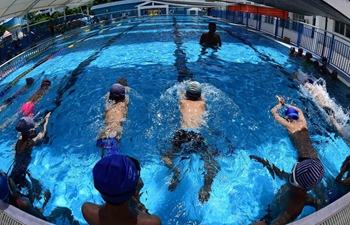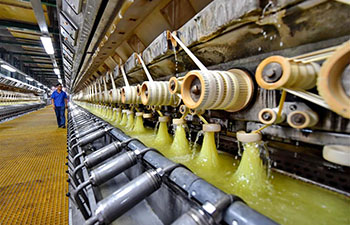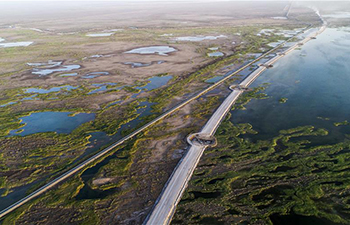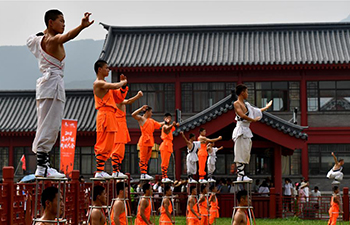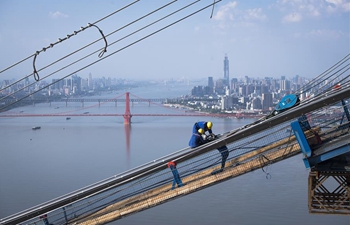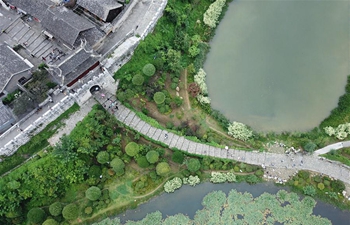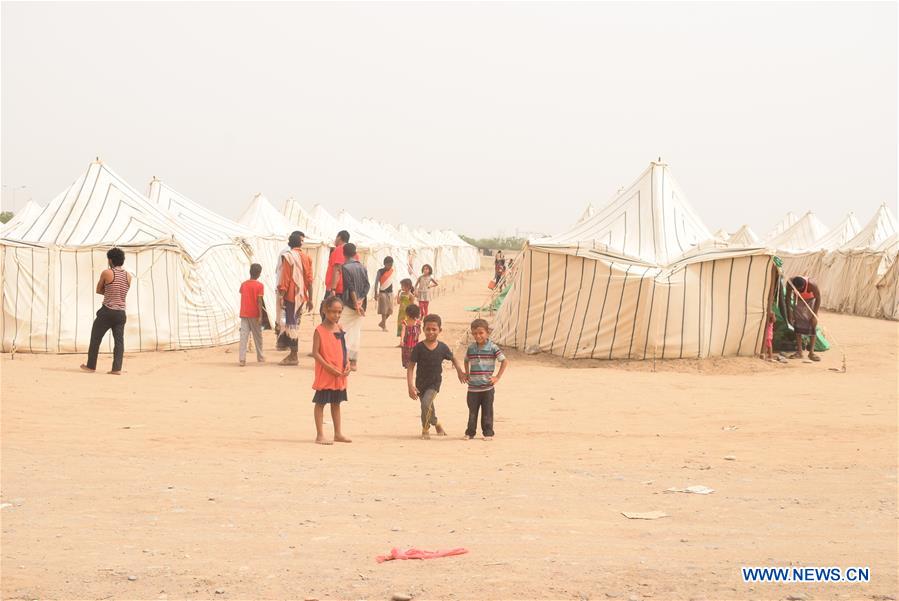
Yemeni displaced children are seen in the southern port city Aden, Yemen, on July 12, 2018. Thousands of Yemeni Internally Displaced Persons (IDP) who survived the ongoing armed confrontations between Yemen's government forces and the Houthi fighters in the Red Sea coastal city of Hodeidah, face various challenges in southern port city Aden. (Xinhua/Murad Abud)
by Murad Abdu
ADEN, Yemen, July 12 (Xinhua) -- Thousands of Yemeni Internally Displaced Persons (IDP) who survived the ongoing armed confrontations between Yemen's government forces and the Houthi fighters in the Red Sea coastal city of Hodeidah, face various challenges in southern port city Aden.
The looming summer heat is a new challenge threatening the families that fled the conflict zones in Hodeidah and other war-ravaged Yemeni provinces in Aden, where hundreds of IDP camps are based, .
With temperature already topping 40 degrees Celsius and still rising, families living in tents scattered inside a camp in Aden complained about the difficult living conditions and the scorching summer heat that deprived them from sleeping overnight.
Saleh Rajab, a displaced father from Hodeidah, said that people found it more difficult to bear the scorching summer heat in Aden's IDP camps without electricity or cooling tools.
He said "there are no enough tents and sometimes two families live in one tent along with their children. Tents are too crowded here."
"Living here without electric fans is unbearable because we have children who are suffering the most from this situation," Rajab added.
Some of families displaced from war-torn areas in Hodeidah and took shelters in Aden told Xinhua that the tents distributed by local charity organizations don't work well in summer because they retain extreme heat.
"We received tents that can be used during the winter period to protect refugees from cold, but not in this hot summer," said Um Suad, a mother of three children living in Aden's IDP camp.
"I saved my children from the shelling and fighting in Hodeidah but they are dying now from the heat inside this tent," Um Suad said.
She added that "my children keep screaming and crying at night due to the scorching temperature and I feel helpless and could do nothing to release their pain."
Temperature will continue to rise and is expected to reach at least 48 degrees Celsius and above throughout the summer months in Yemen's southern port city of Aden that is also witnessing repeated power outages.
A Humanitarian officer told Xinhua that Aden is receiving the majority of IDP with hundreds of people fleeing the war-torn areas in Hodeidah, Taiz and other provinces in a daily basis.
Displaced people urged Yemen's government and the international humanitarian organizations to connect their camps with electricity or generators to confront the soaring temperature.
A number of Aden-based businessmen provided some displaced families with summer bed linens and more than 200 battery rechargeable fans which can run extra hours without electricity.
"We need hundreds of rechargeable fans. Some of the families have newborns and didn't receive even one fan," said Hayal Wadah, a displaced man in Aden.
He said that lack of drinking water is affecting their lives in Aden, while recommended ration of water per person each day was about 20 liters for drinking, cooking and hygiene.
The IDP camps in Aden established in a desert area outside of the residential areas without adequate toilets, sparking concerns of health conditions, according to Hayal.
On June 13, the Arab coalition, backing internationally-recognized government of Yemen's President Abd-Rabbu Mansour Hadi, declared a major assault to recapture Hodeidah and the Yemeni western Red Sea coast from the Houthis.
Yemen's government and Saudi Arabia have repeatedly accused the Houthis of using the port to smuggle Iranian weapons. Both Houthis and Iran denied the accusation.
Humanitarian agencies have warned of any attack on the port, saying it would lead to the world's biggest humanitarian catastrophe in modern history.
Hodeidah is the single most important point of entry for food and basic supplies to Yemen's northern provinces controlled by Houthis, including the capital Sanaa.
More than 121,000 residents have fled the war-torn city of Hodeidah and other parts of the province since June 1, the United Nations said this week.
The coalition intervened in Yemen's conflict in March 2015 to roll back Iran-allied Shiite Houthi rebels and reinstate Hadi.





